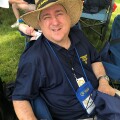
Hello, my name is Ben Collins, and here is my story. I have been working at Special Olympics International in Washington, D.C. for 26 years, and I work in the Branding, Communications, and Content Department. I sort and deliver the mail for the department, conduct donor calls two times a week to thank donors for supporting our programs, lead interviews and office tours, type Braille nametags, act as the department’s co-budget officer, maintain the press kits, participate in Capitol Hill Day to get Members of Congress to support Special Olympics, lead the team meetings, and send calendar invites.
I use three special needs equipment on my desk every day. The first is the visual tech helping me do the mail every day here at my desk. It’s like a giant magnifier. It magnifies the print, and it works because I can see the shadows. The next thing I use is the computer. It’s called the jaws system. When people hear about the jaws, they think it is a shark, but it’s a computer program for people who are visually impaired. The last thing on my desk is the Braille typewriter. It has six keys, and I make Braille nametags for everyone in the office. It helps me find their desks.
When I was in school, I had a vision teacher and a mobility teacher. When I left school, my first job was working at the button factory, called A Major Production. It started out as a temp position but led to a full-time job. I was there for two and a half years.
The next thing I’m going to talk about is my commute. I take public transportation every single day of the week. First, I ride on the bus in my neighborhood, and it takes me to Rockville Metro Station. Then I wait for the metro. Then I take the red line to Farragut North Station, and every day I listen to all the sounds and voices to figure out where I am going. Everything on the train and the bus is voice-activated, so I can listen to where I’m going. Then I have a ten-minute walk from the station to work. I help people on the metro and the bus everyday by helping them figure out which way to go. When I cross the street, I listen for the traffic or ask somebody when it is safe to cross. I listen really hard to the sounds of the traffic. I wish there was something for people who are visually impaired to help them be able to cross the street in DC. In Rockville, some of the corners have countdowns to let you know when it’s time to walk across the street. I wish that people closed their eyes for five minutes every day or tried to walk outside to see what it’s like for somebody like me. If I didn’t have my folding cane, I would run into tables, chairs, trees, walls, or anything on the ground. I wish that people would wear a blindfold to see what it’s like for people who can’t see at all, and that’s why I always say, “Welcome to My World.”

This year, I went to the Special Olympics USA National Games in Seattle, Washington. I participated in the sport of bocce for Team Maryland. We played on the turf instead of grass. I won two silvers and a bronze medal. For me, I have to listen to the voices to tell me where the polena is. The official stands over the polena and he/she asks, “Can you hear me?” If I can’t hear him or her, I ask him or her to say it again. Then I roll the ball. I usually roll the bocce ball against the wall because it is good strategy. I have been a Special Olympics Maryland athlete for 38 years, and the USA Games was my first time competing outside the state of Maryland.
I wish that I could talk to everyone who just learned they have Retina Pigmentosa or other visual impairments to let them know that life’s an obstacle course, but you can get around the obstacle course. It’s hard to be patient, but I had a good full life, and you can do anything when you put your mind to it!
Don’t underestimate me!
Watch a video with Ben and read his interview with ESPN contributer, Ryan Hoff








